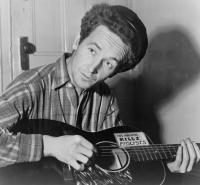 On the 231st birthday of an outrageous experiment in nation-building with a pretty decent soundtrack, I asked our regular Stuck Between Stations contributors to take time from their five-alarm barbecues and traffic jams and hissing summer lawns to answer a simple question: What songs would you like to hear on the Fourth of July, in any style and for any reason? Faster than you can say “Sufjan Stevens,†we all went to look for America, and I said “be careful, my laptop is really a camera.” (Thanks, Apple).
On the 231st birthday of an outrageous experiment in nation-building with a pretty decent soundtrack, I asked our regular Stuck Between Stations contributors to take time from their five-alarm barbecues and traffic jams and hissing summer lawns to answer a simple question: What songs would you like to hear on the Fourth of July, in any style and for any reason? Faster than you can say “Sufjan Stevens,†we all went to look for America, and I said “be careful, my laptop is really a camera.” (Thanks, Apple).
Our stable of beloved revolutionary sweethearts proved worthy of the challenge. In what follows after my opening playlist, Sal Reyes casts George Washington as our founding prophet of rage, tucking into his knickers a “battle-scarred iPod†loaded with classic Public Enemy tracks. Scot Hacker surveys the state of a nation under a groove bold enough to mix Dylan and MC5 with Parliament/ Funkadelic, and explains why Condoleezza Rice won’t serve in President George Clinton’s cabinet. Malcolm Humes passionately describes Robert Wyatt’s relevance to our era of self-evident “truthiness†and freedom with asterisks.Christian Crumlish puts the jam back in holiday jamboree, from the Dead’s slow stew to the Minutemen’s quick sizzle.
Since my list includes James Brown’s Ford Administration civics lesson, “Funky President,†I’ll get things rolling with a teaser—David McMillan’s classic rant about the cosmic connections between James Brown and Gerald Ford.
Playlist One: The Other Side of the Road
By Roger Moore
•James Brown, “Funky President (People it’s Bad)”
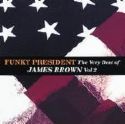 It’s not clear to me whether James Brown actually thought Gerald Ford was the “brand new funky President,” or whether he merely thought we needed one. Nor was the hardest-working man of the Seventies volunteering for the job; in the song, he modestly only offers to serve as mayor or governor. But there’s no reason to quibble. After the twin sucker punches of Vietnam and Watergate, the country couldn’t move on until it had assured itself that it still had a pulse. And what “Funky President” provided, at just the right time, was one of the most ripping pulses in American history.
It’s not clear to me whether James Brown actually thought Gerald Ford was the “brand new funky President,” or whether he merely thought we needed one. Nor was the hardest-working man of the Seventies volunteering for the job; in the song, he modestly only offers to serve as mayor or governor. But there’s no reason to quibble. After the twin sucker punches of Vietnam and Watergate, the country couldn’t move on until it had assured itself that it still had a pulse. And what “Funky President” provided, at just the right time, was one of the most ripping pulses in American history.
“Funky President” sounds familiar, in part, because its samples launched a hundred or so hip-hop songs, including Eric B and Rakim’s enduring “Eric B is President.” In retrospect, we have had far worse Presidents than James or Eric B, and for the role of Minister of Propaganda I’d trade Karl Rove in a heartbeat for Rakim, who at least appreciates modern science. After more than thirty years, “Funky President” sounds as fresh in the age of Scooter Libby as it did in the age of G. Gordon Liddy. I do, however, have unequivocal proof that even “Funky President” could not make John Kerry funky.
•Woody Guthrie, “This Land is Your Land” (alternate version)
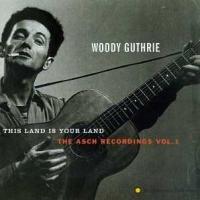 The songs on all our Fourth of July playlists make me think about something Woody Guthrie saw, literally, on the other side of the road. As Joe Klein and Bruce Springsteen have noted, “This Land is Your Land†was originally written as an answer song to Irving Berlin’s non-confrontational “God Bless America.†But the story goes further than that. An earlier version of the song (original title: “God Blessed America for Meâ€) contained additional verses, including the following: “As I was rumbling that dusty highway/ I saw a sign that said ‘private property’/ But on the other side, it didn’t say nothing/ That side was made for you and me.â€
The songs on all our Fourth of July playlists make me think about something Woody Guthrie saw, literally, on the other side of the road. As Joe Klein and Bruce Springsteen have noted, “This Land is Your Land†was originally written as an answer song to Irving Berlin’s non-confrontational “God Bless America.†But the story goes further than that. An earlier version of the song (original title: “God Blessed America for Meâ€) contained additional verses, including the following: “As I was rumbling that dusty highway/ I saw a sign that said ‘private property’/ But on the other side, it didn’t say nothing/ That side was made for you and me.â€
You could pass these lines off as simplistic socialist ranting. And considering that Woody borrowed the song’s melody from the Carter Family’s version of the traditional “When the World’s on Fire,” his approach to property was perhaps convenient. But Woody Guthrie shouldn’t be underestimated; as the recent Mermaid Avenue records and last year’s great Guthrie-based Klezmatics albums (Wonder Wheel and Happy Joyous Hanukkah) made clear, we are just getting to know this simple and profound, sacred and profane lonesome hobo. Sloganeering aside, there’s something fascinating about the urge to look on the other side of that sign. Independence Day is a perfect time to remember that there’s a different America on the other side of the road, one with restless wanderers fighting to get counted and get by.
•Long Ryders, “Looking for Lewis and Clark”
It would be easy to have a laugh at the Long Ryders’ expense. Their Eighties hair and clothes seem to have been lifted from a Wild West theme park, and leader Sid Griffin–who now fronts a bad-pun bluegrass combo called the Coal Porters–borrowed Neil Young’s seventies muttonchop sideburns years before Jay Farrar. There was also their fairly cheesy commercial for Miller Beer, which featured the off-putting line, “you don’t have to be the greatest band, you just have to mean it.” Maybe I’m just not a macrobrew kind of guy.
But “Looking for Lewis and Clark” is borderline brilliant, and a near-perfect Fourth of July song. Among its many joys is that I have no idea what they mean. After a guitar blast and a rebel yell, Griffin launches into a weird detective story, searching for evocative historical figures with the surreal abandon you’d expect from a short Thomas Pynchon novel. And I love how he works the band name into the song lyrics, just like Wang Chung. There’s a vague hint of Reagan-era protest (“I thought I saw a diplomat hawking secret plans in the park/ I thought I saw the President walking in Harlem late after dark”), but it just adds to the intrigue.
•Creedence Clearwater Revival, “Fortunate Son”
Too many earnest attempts at making topical protest music, or any kind of “serious” rock, turn out feeling a little like Edward Everett’s two-hour, 13,607-word oration that preceded Lincoln’s Gettysburg Address. But John Fogerty, born in Berkeley rather than the Bayou, had different ideas. “Fortunate Son” is the Gettysburg Address of American popular music, and like its storied predecessor, it pumps out nostop searing intelligence lasting between two and three minutes without wasting a single word or beat. In the clip below, even Ed Sullivan must have been impressed. (Don’t miss Sleater-Kinney‘s fierce live cover of “Fortunate Son,” either.)
Creedence Clearwater Revival – Fortunate Son
Add to My Profile | More Videos
•Wilco, “Ashes of American Flags” and “A Magazine Called Sunset”
When I went to an ATM and a convenience store last week, I got a demagnetized credit card and a case of heartburn. Jeff Tweedy did the very same thing, and ended up with perhaps the most starkly beautiful gaze at the lonely American soul since the heyday of the Band. Two alternate versions of “Ashes” are worth seeking out–Wilco’s live performance on the Kicking Television album, for Nels Cline’s withering guitar solo, and Brooklyn singer Jennifer O’Connor’s stirring cover (available on iTunes), which strips away Yankee Hotel Foxtrot‘s dense atmospherics and gets at the emotional core of the song. “Sunset,” a YHF outtake available as a download on the band’s Wilcoworld website, is as sunny as “Ashes” is sullen, but it shares the same attention to small details and mood of impossible yearning.
•Sleater-Kinney, “Combat Rock”
This is the sound of Portland calling to the faraway towns in 2002, with 9/11 in the rearview mirror, war drums beating on the horizon, and Alfred E. Neuman in the White House. The Clash song this one recalls isn’t anything from Combat Rock, but rather the reggae-influenced martial beat of “(White Man in) Hammersmith Palais.” Guitar whiz Carrie Brownstein spits out the question, “Since when is skepticism un-American?” Damn good question.
•Dave Alvin/ X, “Fourth of July”
Dave Alvin makes a much better King of California than Arnold Schwarzennegger, or to name his real competition, water baron J.G. Boswell. There are flashier songwriters, but few are better, and this captures his talent at its smoldering, redemptive best. “On the stairs I smoke a cigarette alone/ Mexican kids are shooting fireworks below,” the song goes, and you can virtually smell the smoke and hear the explosions. X, which briefly featured Alvin as guitarist, made the song an anthem, but don’t miss the rougher, rootsier solo versions by John Doe, Robert Earl Keen, and Alvin himself.
•Martha and the Vandellas, “Dancing in the Street”
Music, sweet music. Don’t forget the Motor City.
Playlist Two: Children of the Revolution
By R. Sal Reyes

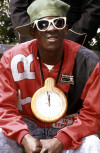 Considering the state of the nation on this Fourth, I’d like my holiday soundtrack to remind everyone that in 1776, independence meant Revolution, with a capital R. Independence Day ought to remind us that we were born by an act of audacious rebellion. We could use a little audacious rebellion these days.
Considering the state of the nation on this Fourth, I’d like my holiday soundtrack to remind everyone that in 1776, independence meant Revolution, with a capital R. Independence Day ought to remind us that we were born by an act of audacious rebellion. We could use a little audacious rebellion these days.
My choice is a short Public Enemy playlist that briefly chronicles the true spirit of that great American Rebellion. I’m a big fan of the Father of Our Country (and I’ve even lionized him in a short story) and I’m thoroughly convinced that were the Revolution to occur today, Washington’s battle-scarred iPod would contain only PE albums. And these are the tracks on ol’ George’s special we-kicked-some-fancy-Brit-ass playlist:
•“Prophets of Rage” (from It Takes a Nation of Millions to Hold Us Back). The first salvo in the battle–the opening exchange in this track between a “White Guy/The Man” and Flav captures that moment when King George first realized that he had trouble on his hands (White Guy: “You’re quite hostile.” Flav: “I gotta right to be hostile you’re persecutin’ my people!”). This is the song you play to kick off a revolution. These are our Founding Fathers, ladies and gentlemen, “The Prophets of Rage.”
•”War At 33 1/3” (from Fear of a Black Planet). The conflict erupts. You can hear the rebels loading their muskets, and launching guerilla raids as Chuck D spits out his rat-a-tat delivery.
•”Revolutionary Generation” (from Fear of a Black Planet). The title says it all. The conflict is in full swing. (Okay, so the lyrics are actually mostly about gender, but it’s universal–freedom, revolution–get with it, we’re all brothers and sisters fightin’ the man, aren’t we? And just check out those African rhythms–this song inspires revolution.)
•”By the Time I Get to Arizona” (from Apocalypse 91…The Enemy Strikes Black). The purest musical distillation of what Washington and his men were feeling as they made their final push from New York to corner Cornwallis before the siege of Yorktown. Replace “Arizona” with “Cornwallis” and imagine Lafayette rapping Flav’s lines and you’ll know exactly what I’m saying.
•“Fight the Power” (from Fear of a Black Planet). This should have been the national anthem, just to remind us that we built a government that was meant to be fought — that was supposed to be the process (as opposed to our current model, which is more like “Be Quiet and Listen to The Power and We Promise to Get Everything Wrong and Fuck Everything Up, and, Seriously, Didn’t You Hear the Part Where We Told You to be Quiet?”). Fight the Power, indeed — that’s the meaning of Independence Day.
Playlist Three: One Nation Under a Groove
By Scot Hacker
•Neil Young, “Ohio”
The song isn’t really about independence, but to me it’s patriotic. As Neil Young himself noted, “It’s still hard to believe I had to write this song.” In some parts of the country, the song was banned from playlists because of its “anti-war” and “anti-Nixon” sentiments.
Thirty years later, the London Times reported that Clear Channel distributed a list of 150 songs that its member stations were instructed to censor following the terrorist attacks of September 11th. I’d say any song banned by Clear Channel at any time would make for good July 4 listening.
•Wendy Rene, “Bar-B-Q”
No 4th would be complete without a funky plate of ribs, oozing with soul sauce. Wendy Rene‘s second release for Stax Records, “Bar-B-Q” (November 1964) “sounds like Rene imitating the Jackson Five.” Drippings from this delicious track may leave indelible stains on your white trousers, but you’ll be too busy getting down to notice.
[audio:http://stuckbetweenstations.org/wp-content/uploads/2007/07/05-bar-b-q.mp3]•Parliament, “Chocolate City”
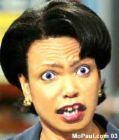
 Thirty years later we have Condi Rice. Mizz Noze, D’void of Funk.
Thirty years later we have Condi Rice. Mizz Noze, D’void of Funk.
“They still call it the White House
But that’s a temporary condition, too.
…
And when they come to march on ya
Tell ’em to make sure they got their James Brown pass
And don’t be surprised if Ali is in the White House
Reverend Ike, Secretary of the Treasury
Richard Pryor, Minister of Education
Stevie Wonder, Secretary of FINE arts
And Miss Aretha Franklin, the First Lady
Are you out there, CC?”
•Bob Dylan, “Chimes of Freedom”
This song’s abstractions make it hard to pin down. It’s not so much political; more an abstracted cry for freedom for troubled souls, rebels, rakes, poets and painters, “guardians and protectors of the mind.” This is the most pure-hearted freedom song I know.
“Tolling for the aching ones whose wounds cannot be nursed
For the countless confused, accused, misused, strung-out ones an’ worse”
It’s a prayer song.
•MC5, “Kick Out the Jams”
The band says the song doesn’t mean as much as people think it does, but anyone who rocks like that while draped in a flag and proclaiming “Free LSDl! Fucking in the streets!” gets a spot on the list automatically.
•Funkadelic, “One Nation Under a Groove”
It’s light stuff, but it is a beautiful vision for a glorious nation.
“Do you promise to funk, the whole funk,
nothin’ but the funk
One nation under a groove
Gettin’ down just for the funk of it
One nation and we’re on the move
Nothin’ can stop us now”
Playlist Four: Robert Wyatt’s Freedom Ride
By Malcolm Humes
Robert Wyatt’s bittersweet “At Last I am Free†is the first song that comes to mind when I think of songs about freedom. The song comes off as a love song that questions and doubts that love: “At last I am free/ I can hardly see in front of me.” It’s a cover of a Chic song, of all things, but Wyatt makes it his own, and sings from the heart. There’s something about Wyatt’s voice that hits me with a powerful intimacy tempered a bit with melancholy feelings. The song comes across as the reflective end of a journey, having reached “freedom” only to be blinded and to see it as something different than what we thought we had. Wyatt is widely respected and much loved, but there’s usually this touch of sadness to him that seems so lonely.
Robert Wyatt has been crippled since a fall in 1974, which often seems to be a subtext in his work. But I also see him as sad about the world being the way it is. That fall that took away his mobility but also opened up his work to a new freedom to really be himself. While physically limited, he created his best music after the tragedy, as powerful as Dylan or Phil Ochs in his lyrical political commentaries.
Wyatt’s version of “At Last I am Free,†and his own song “United States of Amnesia,†seem appropriate songs about freedom at a time when our liberty is at risk and eroding. They leave me with a kind of melancholy perspective on the state of government today — especially as I’ve recently been reading quite a bit on the Revolutionary era, and reading the words and intent of the people who created this “freedom” we enjoy. One book I’m reading now on the native American Indians in the Revolution has me recoiling from the stories the Indians caught between both sides. Both armies burned their crops and villages, destroying their way of life. Those that sided with the British had land seized afterwards, and those that fought with us for freedom were also quickly forgotten and shoved aside in land grabs. There were Indian towns like Stockbridge that merged European and Indian cultures before the war, and then saw Indians exploited once the war was over.
The apparently noble intent of our founding fathers clashed with the class divisions that declared Indians and slaves to be second-class citizens not deserving of the equality that all had fought for together. American freedom has always remained a fleeting challenge to grasp and hold onto — especially for Indians, blacks, women, immigrants and gays. One message I take from that is that fighting for freedom is an ongoing battle that requires diligence. It seems to ebb and flow but it seems that freedom is often something one has to fight for, work for, and suffer for to taste it.
Playlist Five: Paranoid Jam Time
By Christian Crumlish
•Nitty Gritty Dirt Band, “Battle of New Orleans”
While recorded in different dates and times, this War of 1812 story was a patriotic song, at least.
•Grateful Dead, “US Blues”
“US Blues” is one of their more rocking songs, with a parade of American archetypes (“shake the hand/that shook the hand/of P.T. Barnum/and Charlie Chan”).
•Neil Young, “Rockin’ in the Free World”
Self-explanatory.
•XTC, “Living Through Another Cuba”
It delivers that paranoid, brink-of-apocalypse feeling.
•Heaven 17, “(We Don’t Need That) Fascist Groove Thing”
“Reagan’s president-elect/cross that great white ocean/history repeats itself/fascist god in motion.”
•Rufus Thomas, Walking the Dog
Asked the fellow for fifteen cents,
see the fellow he jumped the fence.
Jumped so high he touched the sky,
never got back till the fourth of July.
Walkin’ the dog,
just a-walkin’ her dog.
•Minutemen, “I Felt Like a Gringo”
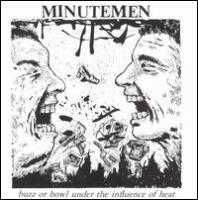 Inspirational lyric:
Inspirational lyric:
“Who won” I said “the election?”
he laughed, I felt like a gringo
we paid for a song and they had fun with us.
why can’t you buy a good time?
why are there soldiers in the streets?
why did I spend the fourth in someone else’s country?”
Wonderful stuff. I heard a band cover “This Land” just two weeks ago and found myself getting misty eyed. “Fortunate Son” never fails to strike a nerve.
Me? I substitute Bruce’s “Born in the USA” for “Shut out the Lights”. I’d also find an old video copy of Marvin Gaye doing the National Anthem at the NBA All Star Game. I might be tempted to rev up the Clash’s “I’m So Bored”, but would probably settle for Sam Cooke’s “A Change is gonna come.” From his lips…